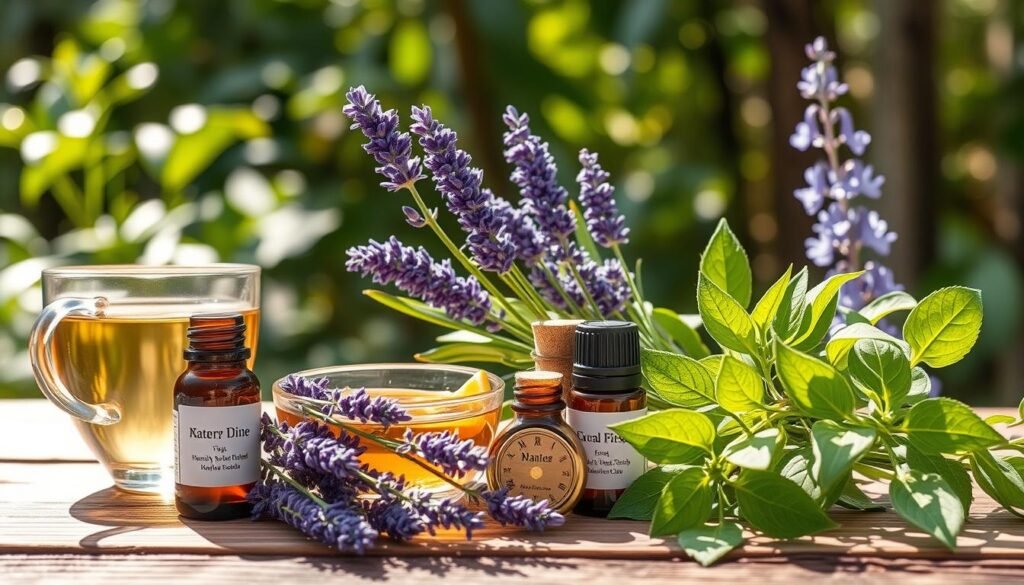About 40 million adults in the U.S. struggle with anxiety disorders. That’s nearly 18.1% of the population. These disorders include Generalized Anxiety Disorder, panic disorders, and social anxiety. Sadly, about 70% of people with these disorders don’t get help. This shows a big gap in mental health support. But, there’s hope. There are proven ways to lessen anxiety symptoms. We will look at natural anxiety remedies and lifestyle changes that boost well-being. This article offers practical tips for those seeking relief.
Key Takeaways
- Anxiety affects about 40 million adults in the U.S., indicating a widespread issue.
- Effective strategies, including lifestyle changes, can significantly reduce anxiety symptoms.
- Natural remedies for anxiety can offer relief without the need for medication.
- Anxiety management techniques are essential for improving overall mental health.
- Seeking support can improve anxiety outcomes, reducing the stigma associated with mental health.
Understanding Anxiety: What It Is and How It Affects You
Anxiety is how our bodies react to stress. It’s like an alarm system for danger. It’s important to know that anxiety comes from many sources. These include our genes, things around us, and how our brains work. It makes people feel scared, worried, and uneasy.
About 1 in 5 adults in America deal with anxiety each year. For example, 7 million have generalized anxiety disorder. And 15 million suffer from social anxiety disorder. Another 6 million have panic disorder. Knowing these facts helps us understand how crucial it is to manage anxiety.
Anxiety is more common in women than in men. About 1 in 3 kids will experience it too. Stressful life situations, like money problems or bad relationships, often cause anxiety. Harsh experiences, such as abuse, make it worse.
Getting to know anxiety is key to dealing with it. Many struggle with panic disorder, PTSD, OCD, and phobias. Treatments like cognitive behavioral therapy (CBT) really help. So does talking therapy. Research into brain connections gives new hope for finding effective treatments.
| Condition | Estimated Number of Adults Affected |
|---|---|
| Generalized Anxiety Disorder | Approximately 7 million |
| Social Anxiety Disorder | About 15 million |
| Panic Disorder | Around 6 million |
| Overall Anxiety Disorders | Nearly 1 in 5 adults annually |
Common Symptoms of Anxiety
People experience anxiety in different ways. However, there are common signs. Knowing these is key to getting help. Symptoms like increased heart rate, rapid breathing, sweating, and trembling often appear. Trouble focusing and feeling tense or sick are also common.
Some may have panic attacks. These bring strong fear and anxiety suddenly. This can make someone avoid certain places or things. Anxiety can also affect daily life, making work or relationships hard.
The following table showcases various anxiety symptoms and their characteristics:
| Symptoms | Description |
|---|---|
| Increased Heart Rate | A noticeable rise in heart rate, often linked to feelings of panic or stress. |
| Rapid Breathing | Short, quick breaths, which can lead to feelings of lightheadedness or dizziness. |
| Trembling or Shaking | An involuntary physical reaction to anxiety that can manifest visibly. |
| Difficulty Concentrating | An overwhelming sensation that makes focusing on tasks nearly impossible. |
| Panic Attacks | Intense episodes of fear that peak quickly and may provoke a need to avoid specific situations. |
It’s important to know these signs to spot anxiety early. Early action helps manage symptoms better. This can prevent it from getting worse.

What Helps Anxiety: Effective Natural Remedies
Many people look for natural ways to deal with anxiety. They prefer these to traditional treatments. Natural remedies can greatly boost emotional health and well-being. Sleep management, changing one’s diet, and some herbal teas can lower anxiety. Understanding these methods can help people handle anxiety better.
Getting More Sleep
Sleep links closely with anxiety. Not sleeping enough can make anxiety worse. The CDC says adults should get at least seven hours of sleep each night. Making sleep a priority improves mood and helps fight anxiety. To sleep better, try a bedtime routine, cut screen time before bed, and make your bedroom relaxing.
Caffeine can make anxiety worse, not better. Cutting back on caffeine can help those with anxiety disorders. Try herbal teas instead of coffee or energy drinks. This change can help with emotional balance.
Drinking Chamomile Tea
Chamomile tea is known for helping reduce anxiety. It has a calming effect. The ingredient apigenin may lessen generalized anxiety disorder symptoms. Regularly taking chamomile extracts can cut anxiety symptoms by about half. It’s a safe choice for those looking for natural anxiety remedies.

| Natural Remedy | Effectiveness | Considerations |
|---|---|---|
| Chamomile | High | Short-term use is likely safe; high doses can increase bleeding risks. |
| Kava | Questionable | Serious liver damage concerns; FDA warnings present. |
| Passion Flower | Limited | Combined with other herbs; efficacy still being studied. |
| Valerian | Mixed | Considered safe for short durations; results vary by individual. |
| Lemon Balm | Moderate | Generally well tolerated; lacking extensive safety data. |
Coping Strategies for Anxiety Management
Anxiety can feel overpowering. However, certain strategies can really help improve one’s well-being. Adding things like exercise, deep breathing, and mindfulness into your day can bring a sense of control and peace.
Staying Active and Exercising
Being active is key in managing anxiety. Exercise for anxiety, like fast walks or biking, can cut symptoms in half. Aiming for 150 minutes of activity each week boosts mental health too. Yet, less than a quarter of adults hit this exercise goal.
Practicing Deep Breathing Techniques
Deep breathing techniques are great for calming down. Just a few minutes of focused breathing can greatly lower anxiety. Even just counting to ten before reacting can help 70% of people feel less stressed. Making deep breathing a daily habit is a strong way to fight anxiety.
Engaging in Meditation and Mindfulness
Mindfulness and meditation help ground us, cutting anxiety by up to 60%. Using methods like RAIN boosts self-awareness and emotional control. Regular meditation brings relaxation and aids in mental well-being, perfect for those needing mindfulness for anxiety relief.

| Coping Strategy | Effectiveness Rate | Recommended Duration |
|---|---|---|
| Exercise | 50% reduction in symptoms | 150 minutes/week |
| Deep Breathing | 70% show lower stress levels | 5-10 minutes daily |
| Meditation | 60% reduction in symptoms | 10-20 minutes daily |
Adopting these strategies can improve your life by helping you manage anxiety well.
Healthy Habits for Anxiety Relief
Adding healthy habits to daily life is key to reducing anxiety. Diet and anxiety changes show how the right foods enhance mood and well-being. We’ll look at how what we eat and avoiding bad substances help keep our emotions in check.
Eating a Nutrient-Dense Diet
Eating a diet full of nutrients helps ease anxiety. Foods with vitamins, minerals, and healthy fats boost brain health. Here’s what to include:
- Fruits and vegetables, full of nutrients and antioxidants.
- Whole grains, which steady blood sugar and boost serotonin.
- Omega-3 fatty acids in fish like salmon aid mood regulation.
Studies show eating lots of processed foods and sugar ups stress. Choose whole foods for better mental health. Also, drink enough water, as even slight dehydration can darken mood and heighten anxiety.
Limiting Alcohol and Tobacco Use
The effects of alcohol on anxiety are complex. Alcohol might seem soothing, but it disturbs sleep and increases anxiety later. Drinking less alcohol keeps the mood level and stops anxiety from getting worse.
Smoking too, is linked with more anxiety. Nicotine may increase anxiety symptoms. Better coping methods like mindfulness or exercise improve mental health.
| Dietary Choices | Benefits for Anxiety |
|---|---|
| Nutrient-rich foods (fruits, vegetables, whole grains) | Support mood regulation and stable energy levels |
| High omega-3 foods (salmon, walnuts) | Enhance mental health and reduce anxiety |
| Low processed food intake | Lower perceived stress levels and improve overall well-being |
| Limiting alcohol | Reduces anxiety symptoms and improves sleep quality |
| Avoiding tobacco | Lowers anxiety levels and supports mental clarity |
Relaxation Exercises for Anxiety Relief
Relaxation exercises help manage stress effectively. Using stress relief techniques brings immediate calm. They offer long-term relief against anxiety triggers too.
Progressive muscle relaxation is one useful method. It involves tensing muscle groups briefly then relaxing them. Doing this regularly reduces stress hormones, improves circulation, and lowers muscle tension.
Visualization helps as well. Imagining peaceful scenes creates a mental escape. Adding deep breathing shifts you from anxiety to relaxation. Doing this ten times can really ease anxiety.
Tai chi and yoga are amazing for stress relief. They promote mindfulness, calming your thoughts and easing anxiety.
These exercises make you more focused, sleep better, and feel happier. People feel more confident in handling challenges with regular practice.
Being consistent with relaxation techniques is key. The more you practice, the better you get at calming yourself. This replaces stress responses with peace.
Self-Care for Anxiety: Prioritizing Your Well-being
Self-care for anxiety is key to managing mental health. It involves a routine that boosts emotional and physical well-being. About 40% of people who focus on self-care see better mood and well-being. This helps them deal with anxiety better.
Self-care practices lower stress levels. Mindfulness can cut stress by 40%. Regular exercise reduces anxiety symptoms by 20-30%. Walking, swimming, or yoga improve both physical and mental health.
Social connections play a big role in emotional health, but 40% have trouble keeping them. Good social support can cut anxiety symptoms by half. Spiritual activities like meditation or prayer boost life satisfaction by 50%.
What you eat matters a lot for mental health. Foods with omega-3 fatty acids drop anxiety levels by about 25%. Eating fruits, veggies, and grains helps too. Matching these foods with self-care routines brings the best results.
| Self-Care Activity | Benefits |
|---|---|
| Regular Exercise | Reduces anxiety by 20-30% |
| Mindfulness Practices | Decreases anxiety levels by about 25% |
| Social Engagement | Reduces anxiety symptoms by up to 50% |
| Healthy Diet | Improves mood regulation by 25% |
| Journaling | Increases feeling of control over anxiety |
Self-care for anxiety means making health a priority. Committing to mental health care can cut anxiety symptoms by 30%. By using holistic methods that boost emotional quality, we can live healthier, more balanced lives.
Utilizing Technology: Apps and Tools to Reduce Anxiety
Technology provides new ways to help with anxiety management. There are apps for anxiety tracking and mindfulness. These apps let users actively monitor their mental well-being. They can track their progress and learn about their anxiety patterns.
Tracking Your Anxiety Symptoms
Anxiety tracking apps let users log how they feel and find what triggers their anxiety. They can keep a detailed record of their symptoms over time. This helps them make better decisions for their mental health. Using these apps regularly is key to understanding and managing anxiety.
By recording daily emotions, users can see how their actions impact their anxiety. This helps in reducing their symptoms.
Using Mindfulness Apps
Mindfulness apps provide guided meditations and ways to relax, aiming to lower anxiety. They encourage daily mindfulness practice for better mental health. These apps are easy to use, making it simpler to fight stress every day.
When people use these tools, they access methods that are backed by science. This helps them build emotional strength.
Conclusion
Managing anxiety well means you need a full plan. This includes knowing how to ease anxiety, spotting symptoms, using natural cures, and living healthy. In the U.S., around 40 million people face anxiety disorders. It’s key to see how these steps can really make life better.
Not many people with anxiety get proper help, only 36.9%. Mixing therapy, meds, and self-care can boost how well you handle anxiety. Doing things like __Regular exercise__, staying mindful, and eating right are major parts of this path.
Making anxiety management a priority is good for your mental health and makes life richer. Start by understanding your anxiety well. Then, use what we talked about to lessen the symptoms and do better every day.